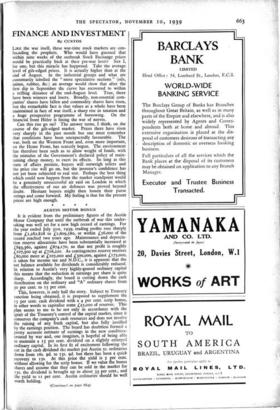FINANCE AND INVESTMENT
By CUSTOS
LIKE the war itself, these war-time stock markets are con- fotinding the prophets. Who would have guessed that within nine weeks of the outbreak Stock Exchange prices would be practically back at their pre-war level? Not I, for one, but this miracle has happened. Take the average level of gilt-edged prices. It is actually higher than at the end of August. In the industrial groups and what are customarily labelled the " more speculative sections " (oils, mines, rubber, &c.) an average would show that after the first dip in September the curve has recovered to within a trifling distance of the end-August level. True, there have been winners and losers. Broadly, non-essential com- panies' shares have fallen and commodity shares have risen, but the remarkable fact is that values as a whole have been maintained in face of war itself, a sharp rise in taxation and a huge prospective programme of borrowing. On the financial front Hitler is losing the war of nerves.
Can this rise go on? The answer turns, I think, on the course of the gilt-edged market. Prices there have risen very sharply in the past month but one must remember that conditions have been unexpectedly favourable. The war, both on the Western Front and, even more important, on the Home Front, has scarcely begun. The environment has therefore been such as to allow weight of funds, with the stimulus of the Government's declared policy of main- taining cheap money, to exert its effects. So long as this state of affairs persists, buyers will outweigh sellers and the price rise will go on, but the investor's confidence has not yet been subjected to real test. Perhaps the best thing which could now happen from the market standpoint would be a genuinely unsuccessful air raid on London in which the effectiveness of our air defences was proved beyond doubt. Hesitant buyers might then loosen their purse strings and come forward. My feeling is that for the present prices are high enough.




































 Previous page
Previous page